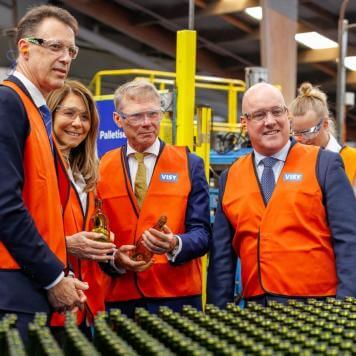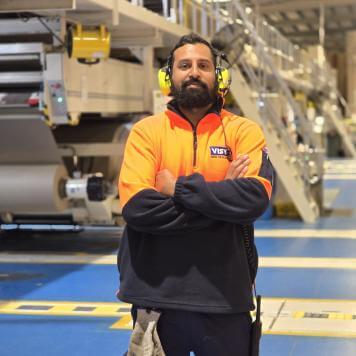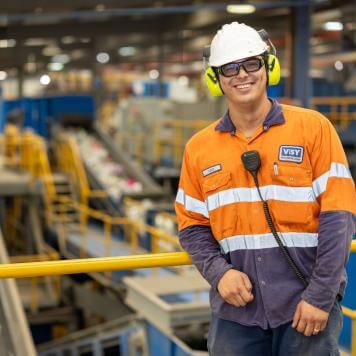The Australian Packaging Covenant Organisation (APCO) 2025 National Packaging Targets require the industry to drive systematic change in the way packaging is designed, produced, collected and recovered. New Zealand has similar targets in place.
We chat with Kate Baker, Circular Economy & Sustainability Manager, about Visy’s role as an integral partner in helping industry and government work towards their sustainable packaging targets.
Tell us a little about APCO’s 2025 National Packaging Targets.
The 2025 National Packaging Targets are supported by Australian industry and government to deliver a new and sustainable approach to packaging. They apply to all packaging that is made, used and sold in Australia. APCO is the organisation charged by government to facilitate the delivery of the 2025 Targets in Australia.
The APCO 2025 Targets are:
1. 100% reusable, recyclable or compostable packaging.
2. 70% of plastic packaging being recycled or composted.
3. 50% of average recycled content included in packaging (revised from 30% in 2020).
4. The phase out of problematic and unnecessary single-use plastics packaging.
These targets are ambitious and require both technical change from industry as well as behavioural change from end consumers to be achieved. New Zealand has similar targets in place.
How does Visy support progress against the packaging targets?
Visy is a member of APCO and has been a signatory to the Australian Packaging Covenant since its inception in 1999. We are committed to work with all packaging stakeholders – customers, consumers, suppliers, industry and government – to develop packaging solutions that minimise environmental and social impacts throughout the product’s entire lifecycle.
We are working closely with our customers across design and production to develop packaging that will help us collectively meet the targets. This includes ensuring packaging is designed for purpose whilst maximising opportunities to:
-
use sustainable packaging materials;
-
include recycled content;
-
improve recyclability through kerbside collections; and
-
utilise recycling collection opportunities to enable packaging to be re-manufactured back into packaging.
As our unique model offers both recycling and re-manufacturing, we offer the ability to include recycled content into our sustainable packaging solutions from the recyclables we collect through kerbside and commercial collections.
What kind of examples do you have of Visy innovations that are helping customers meet the APCO targets?
A great example is the development of our closed loop fibre cluster pack solution which is made from recycled content and is recyclable. Cluster packs are the packaging which hold multiple bottles or cans together, grouping them for sale and providing a convenient carrying feature. Our fibre solution eliminates the need to use plastic shrink wrap and supports the APCO targets as it is recyclable, can be made from 60% recycled content, and is manufactured locally using paper predominately sourced from kerbside collections. The fibre-based packaging is customisable, able to support a range of cluster pack sizes and improves sustainability performance.
To help phase out single-use plastics packaging, we’ve also developed the Enviropunnet™ - a recyclable sustainable punnet packaging solution that enables customers to confidently deliver fresh produce to consumers. It can be made from FSC® certified fibre that is environmentally responsible. The pre-packed format of the Enviropunnet™ offers retailers the benefit of reduced spoilage, while consumers appreciate the increased convenience and hygiene of ‘grab-and-go’ shopping experiences. The introduction of packaging options like the Enviropunnet™ are helping drive progress to phase out problematic and unnecessary single-use plastic.
This is an important point, because not all plastic packaging is unsustainable. Tell us more about this.
There is a role for recycled plastics in the circular economy. With the right processes and systems, plastic packaging can be made from recycled material and be recycled after use.
In 2012, Visy opened Australia’s first recycling plastics plant, using US FDA approved recycling processes to turn plastic collected from kerbside recyclables back into food grade recycled PET and HDPE. The state of the art plastics recycling facility in Smithfield, NSW, is currently the only bottle to bottle, food grade plastics recycling facility in Australia – this basically means we are recycling used bottles to make new bottles.
In 2021, we invested a further $19m to increase capacity at Smithfield. Visy is the first company in Australia to be able to recycle PET thermoforms (pots, tubs, trays) and coloured PET.
The 2025 National Packaging Targets are supported by ten Sustainable Packaging Principles. How does Visy support customers to work to these principles?
We support APCO’s 10 Sustainable Packaging Principles and we work collaboratively to achieve sustainable packaging outcomes in all the regions we operate in.
Take for example our investment in technology that enables us to significantly ‘lightweight’ glass packaging, reducing the amount of glass in a container whilst maintaining structural integrity. We have worked to reduce the weights of a selection of stock wine bottles, including reducing our punted Burgundy bottle by 15 per cent and our premium claret bottle by more than eight per cent, compared to our previous stock bottles. These reductions result in lower emissions packaging. This innovation helps our customers achieve packaging principle #2 ‘Optimise material efficiency’.
Another example is the work we’ve done against principle #3 ‘Design to reduce product waste’ with the development of our poly-free linerless boxes that eliminate the need for plastic packaging for meat. The boxes are designed to maintain hydration and freshness, enabling meat and poultry processing without fear of poly-entrapment (where the plastic liner is trapped into the product during the transportation or freezing process causing food quality issues).
What advice would you give to customers who want to fast-track their progress against their packaging sustainability targets?
If you’re interested in finding out more about how we can help you achieve your sustainability targets, you can have a read of our 2022 progress report. Your Visy representative can also discuss options with you to help you meet your sustainability targets while ensuring your packaging remains designed-for-purpose. By working together, we can all be part of better.



